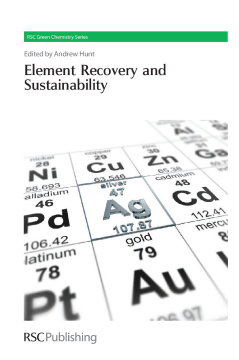
Additional Information
Book Details
Abstract
Increased consumption of electronic equipment has brought with it a greater demand for rare earth elements and metals. Adding to this is the growth in low carbon technologies such as hybrid fuel vehicles. It is predicted that the global supply of rare earth elements could soon be exhausted.
A sustainable approach to the use and recovery of rare earth elements is needed, and this book addresses the political, economic and research agendas concerning them. The problem is discussed thoroughly and a multi-disciplinary team of authors from the chemistry, engineering and biotechnology sectors presents a range of solutions, from traditional metallurgical methods to innovations in biotechnology. Case studies add value to the theory presented, and indirect targets for recovery, such as municipal waste and combustion ash are considered.
This book will be essential reading for researchers in academia and industry tackling sustainable element recovery, as well as postgraduate students in chemistry, engineering and biotechnology. Environmental scientists and policy makers will also benefit from reading about potential benefits of recovery from waste streams.
Andrew Hunt joined the Chemistry Centre of Excellence at University of York in 2001 as an M.Sc. student after he had obtained his first degree in Chemistry from Swansea University. On gaining a distinction for M.Sc. degree he went on to complete his Ph.D. on the extraction of high-value chemicals from British upland plants. Post-doctoral experience has included research on a project on the extraction of liquid crystals and other valuable components from waste electrical and electronic equipment with supercritical carbon dioxide, funded by the UK government. This successful project was awarded a Rushlight Waste Recycling Award for the most significant technological or innovative development in the field of recycling waste. His other research interests include secondary metabolites extraction, materials chemistry (utilization of waste residues), the applications of supercritical fluids, mesoporous carbons (Starbons) and their use in biosorption for metal recovery.
Prof. James Clark is a graduate of Kings College (BSc, PhD). He is currently Professor of Chemistry and Director of the Green Chemistry Centre of Excellence (GCCE) at the University of York (UK). James has led the Green Chemistry movement in Europe for the last 12 years having established both the world's leading scientific journal on the subject Green Chemistry, and the world's largest private membership network, the Green Chemistry Network. James has published over 400 research articles and edited or authored some 20 books. He has won numerous awards and distinctions including the Royal Society of Chemistry John Jeyes medal, the Society of Chemical Industry Environment medal, the Royal Society of Arts, Manufacture and Commerce and EU Better Environment Awards, and the Prince of Wales Award for Innovation.
